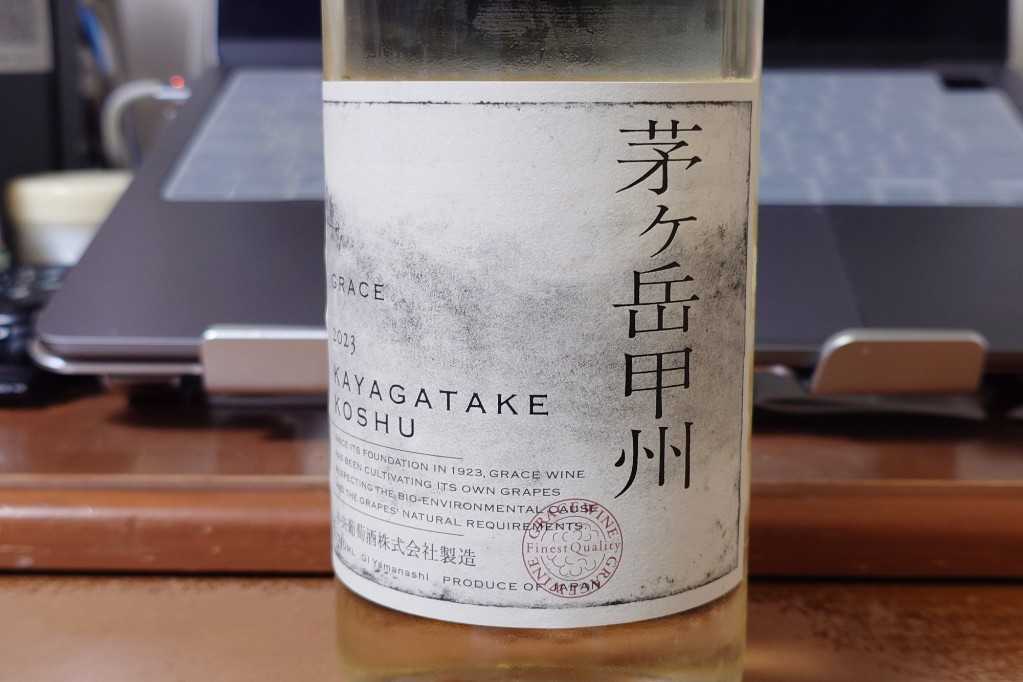テーマ: 今日のワイン(6133)
カテゴリ: 日本ワイン

「茅ヶ岳甲州」とあるので単一畑なのかと思ったら、そうでなくて、茅ヶ岳地区の自社畑や契約農家の葡萄のブレンドらしい。スタンダード銘柄の「グレイス甲州」よりこちらの方が値段も安い。
説明を読んでも、
『茅ヶ岳甲州』は、ボルドー大学の故デュニ・デュブルデュー教授から受けた技術指導を踏襲したワインです。シュール・リーや樽に頼らずに、ブドウ本来の力を素直に引き出すという、クリーンでピュアなワイン造りについて教わったグレイスワインの転機となる体験でした。爽やかでありながらも凛とした強さを感じさせる、繊細なワインに仕上がっています。
ということで、よくわからない。
一方でグレイス甲州には、「菱山畑」「鳥居平畑」といった単一畑銘柄もあり、ユーザー目線ではちょっと混乱するように思う。
それはともかく、グラスに注ぐと色調は淡いイエローで、ほんのりとグリーンがかっている。香りは
小粒の柑橘類や青リンゴ、グラスハーブなど。飲んでみると、いわゆる淡麗辛口な味わいで、心地よい酸が余韻にアクセントを添える。ソーヴィニヨンブランやグリュナーフェルトリナーなどのような強いフレーバーはないのだが、控えめな香味がむしろ和食の繊細な味わいを引き立ててくれそうだともいえる。
酷暑の中を運搬したダメージを心配していたが、これ単体で飲む分にはとくに熱の影響は感じなかった。飲み比べたら少しは違うのかもしれないが‥。
スタンダードな「グレイス甲州」、「グレイス甲州菱山畑」も購入したので、そのうち開けてみたいと思う。
At first glance, the name Kayagatake Koshu suggests a single-vineyard bottling, but that is not the case. In fact, it sits below the flagship Grace Koshu in price.
The winery explains:
The grapes are sourced from vineyards on the slopes of Mt. Kayagatake, including estate-managed parcels, at elevations ranging from 400 to 700 meters. Named after the mountain where Kyūya Fukada, author of “One Hundred Mountains of Japan,” spent his final days, this wine reflects the philosophy imparted by the late Professor Denis Dubourdieu of Bordeaux: a clean, pure expression of Koshu that relies neither on sur lie nor oak. This encounter marked a turning point for Grace Wine, leading to a style that is both refreshing and poised, yet delicate.
The labeling can be a little confusing, especially since the Grace Koshu range also features genuine single-vineyard expressions such as Hishiyama and Toriibira.
In the glass, the wine shows a pale lemon hue with a faint green glimmer. The nose evokes small citrus fruits, green apple, and subtle herbal notes. On the palate, it is light-bodied and dry, with crisp acidity lending a graceful lift to the finish. While it lacks the assertive aromatics of Sauvignon Blanc or Grüner Veltliner, its restrained style makes it an excellent partner for the delicate flavors of Japanese cuisine.
Despite concerns about possible heat damage from transport in midsummer, the wine showed no obvious flaws when tasted on its own. A comparative tasting might reveal subtler differences, but as it stands, the wine is fresh, precise, and enjoyable. I also picked up the standard Grace Koshu and the single-vineyard Grace Koshu Hishiyama, which I look forward to opening in the near future.
お気に入りの記事を「いいね!」で応援しよう
[日本ワイン] カテゴリの最新記事
-
いろグラン甲州2024(まるき葡萄酒)Iro-g… 2025年10月31日
-
いろベーリーA2024(まるき葡萄酒)Iro-Be… 2025年10月27日
-
フジクレール・マスカットベリーA樽熟成20… 2025年10月14日
【毎日開催】
15記事にいいね!で1ポイント
10秒滞在
いいね!
--
/
--
PR
X
Comments
shuz1127
@ Re[1]:モーリス・ユトリロ展@SOMPO美術館~その1 Maurice Utrillo Exhibition at the SOMPO Museum — Part 1(11/10)
Henryさん おお、西山美術館に行かれたの…
Henry@ Re:モーリス・ユトリロ展@SOMPO美術館~その1 Maurice Utrillo Exhibition at the SOMPO Museum — Part 1(11/10)
西山美術館、メルカリで無料招待券をお安…
shuz1127
@ Re[1]:ほどよく均整の取れたベリーA~マスカットベリーA2023(白百合醸造) Well-Balanced Berry A – Muscat Bailey A 2023 (Shirayuri Winery)(10/10)
noir-funさんへ 熊本ワインファーム、例…
noir-fun
@ Re:ほどよく均整の取れたベリーA~マスカットベリーA2023(白百合醸造) Well-Balanced Berry A – Muscat Bailey A 2023 (Shirayuri Winery)(10/10)
機会があれば是非、熊本ワインファームの…
shuz@ Re[1]:悪くはないのだけど…エラスリス MAX・カベルネソーヴィニヨン2020 “Not bad, but not quite…” — Errazuriz MAX Cabernet Sauvignon 2020(09/24)
noir-funさん ご無沙汰していますが、お…
Category
カテゴリ未分類
(10)お知らせ・リンク集
(29)ワイン新着情報
(515)ワインコラム
(343)ワインコラム2(話飲徒然草拾遺集)
(75)ワインコラム3(RWGコラム拾遺集)
(28)都内近郊散策
(281)こんな店に行った
(326)B級グルメ・カフェ
(248)健康
(219)エッセイ
(76)ひとりごと・備忘録
(541)カミサン推薦ネタ
(28)語学・資格・学び直し
(95)山歩き・ハイキング
(123)アクアリウム・ガーデニング
(339)育児・教育
(88)PCネット時計カメラ
(129)音楽・オーディオ
(70)リフォーム引越し
(50)こんなワイン買った
(129)ボルドー
(99)ブルゴーニュ・ジュブレシャンベルタン
(90)ブルゴーニュ・モレサンドニ
(40)ブルゴーニュ・シャンボールミュジニー
(45)ブルゴーニュ・ヴォーヌロマネ・ヴジョ
(56)ブルゴーニュ・NSG
(58)ブルゴーニュ・その他コートドニュイ
(63)ブルゴーニュ・コルトン・ポマール・ヴォルネイ
(30)ブルゴーニュ・ボーヌ周辺
(56)ブル・ピュリニー・シャサーニュ・ムルソー
(21)ブルゴーニュ・その他コートドボーヌ
(27)ブルゴーニュ・裾モノイッキ飲み!
(221)ブルゴーニュ・その他地域
(37)ボジョレー再発見プロジェクト
(32)シャンパーニュ
(195)ロワール・アルザス・ローヌ
(54)その他フランス
(16)イタリア
(80)スペイン・ポルトガル
(37)ニュージーランド・オーストラリア
(49)USA
(40)安泡道場(シャンパーニュ以外)
(37)その他地域・甘口など
(43)日本ワイン
(64)ワイン会・有料試飲
(173) セシル・トランブレ…
 New!
mache2007さん
New!
mache2007さん
【wine】アルザスシ… New!
ささだあきらさん
New!
ささだあきらさん
貝殻亭でランチ zzz.santaさん
zzz.santaさん
EF210-328 EF510-3… musigny0209さん
グラムノン yonemuさん
yonemuさん
ジャン・ルイ・シャ… hirozeauxさん
hirozeauxさん
実南 月一会 ミユウミリウさん
ミユウミリウさん
ワイン&ジョギング … Char@diaryさん
道草日記 旅・釣… 道草.さん
鴨がワインしょって… うまいーちさん
 New!
mache2007さん
New!
mache2007さん【wine】アルザスシ…
 New!
ささだあきらさん
New!
ささだあきらさん貝殻亭でランチ
 zzz.santaさん
zzz.santaさんEF210-328 EF510-3… musigny0209さん
グラムノン
 yonemuさん
yonemuさんジャン・ルイ・シャ…
 hirozeauxさん
hirozeauxさん実南 月一会
 ミユウミリウさん
ミユウミリウさんワイン&ジョギング … Char@diaryさん
道草日記 旅・釣… 道草.さん
鴨がワインしょって… うまいーちさん
Keyword Search
▼キーワード検索
Calendar
© Rakuten Group, Inc.









